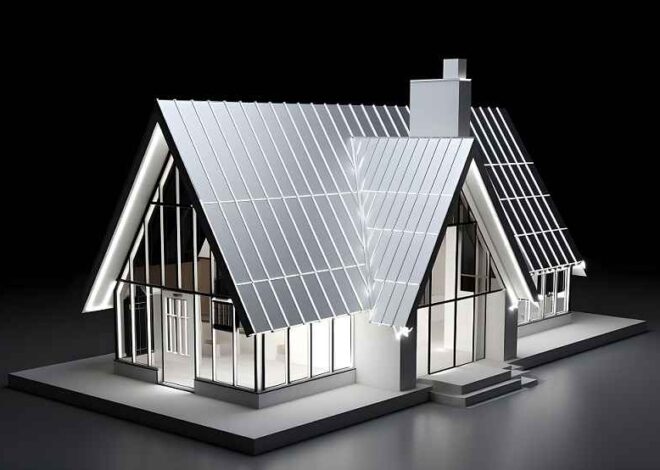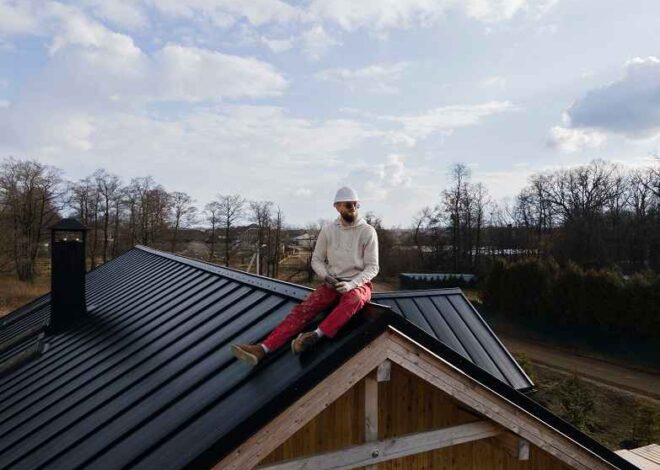
Harnessing the Sun: Top 7 Benefits of Installing Solar Panels on Your Roof
Are you ready to unlock the power of the sun? As energy prices soar and environmental concerns take center stage, there’s never been a better time to consider harnessing solar energy right from your rooftop. Imagine slashing your electricity bills while contributing to a cleaner planet—sounds too good to be true? In our latest blog post, “Harnessing the Sun: Top 7 Benefits of Installing Solar Panels on Your Roof,” we’ll explore how going solar can elevate your home’s value, enhance your sustainability efforts, and provide financial rewards that keep shining bright for years to come. Join us as we dive into this illuminating journey and discover why more homeowners are making the switch!
Introduction: The rising popularity of solar energy
The sun is shining brighter than ever on the renewable energy scene, and more homeowners are taking advantage of its rays. With rising electricity costs and growing environmental concerns, solar energy has become a hot topic in recent years. As technology advances and awareness spreads, the allure of solar panels has captured the attention of many looking to save money and contribute positively to the planet.
Imagine harnessing sunlight right from your rooftop—transforming it into clean energy that powers your home while slashing those pesky utility bills. The benefits don’t stop there; installing solar panels can enhance your property’s value, offer government incentives, and promote an independent energy future for you and your family.
Curious about what makes solar panel installation such a game-changer? Let’s dive into how this investment not only benefits you but also helps create a sustainable future for generations to come.
What are solar panels and how do they work?
Solar panels are devices that convert sunlight into electricity. They consist of many individual solar cells made from silicon, a material known for its semiconductor properties.
When sunlight hits these cells, it excites electrons, generating an electric current. This process is called the photovoltaic effect. The direct current (DC) produced then flows to an inverter, which transforms it into alternating current (AC), making it usable in your home.
Most solar panels also come with protective glass and aluminum frames to withstand harsh weather conditions. By harnessing energy from the sun, they provide a clean and renewable power source.
Installation on rooftops maximizes exposure to sunlight throughout the day. As technology improves, solar panel efficiency continues to rise, making them an increasingly viable option for homeowners looking to adopt sustainable energy solutions.
Top 7 benefits of installing solar panels on your roof:
Installing solar panels on your roof brings a multitude of benefits that extend beyond energy savings.
First, you can significantly reduce your electricity bills. By harnessing the sun’s power, you’ll generate free energy for your home.
Next comes environmental impact. Solar panels lower your carbon footprint and contribute to a cleaner planet by reducing reliance on fossil fuels.
Your property value also sees an uptick with solar installation. Potential buyers are often drawn to homes equipped with renewable energy sources.
Government incentives and tax credits further enhance the appeal. Many regions offer financial perks for making the switch to solar, making it even more accessible.
Those who invest in solar enjoy greater energy independence, protecting themselves from fluctuating utility rates.
Maintenance is surprisingly low-key too; most systems require minimal upkeep while delivering consistent performance.
Lastly, think about long-term savings—solar panels pay off over time through reduced utility expenses and increased efficiency.
-
Save money on electricity bills
One of the most immediate benefits of solar panel installation is the potential to save significantly on electricity bills. Imagine harnessing energy directly from the sun, which can lead to lower monthly expenses.
By converting sunlight into usable energy, you reduce your reliance on traditional power sources. This means less money spent on electricity generated by fossil fuels, which often fluctuates in price.
Many homeowners find that their utility bills drop dramatically after installing solar panels. In some cases, individuals even generate enough surplus energy to receive credits from their utility companies.
These savings accumulate over time and can offset the initial costs associated with purchasing and installing a solar system. The more sunlight your panels capture, the greater your savings will be each month—a win-win for both your wallet and the environment!
-
Reduce carbon footprint and help the environment
Installing solar panels significantly reduces your carbon footprint. Traditional energy sources like coal and natural gas release harmful greenhouse gases into the atmosphere. Switching to solar power helps mitigate this impact.
Solar energy is clean, renewable, and abundant. By harnessing sunlight, you’re not only generating electricity but also contributing to a healthier planet. Every kilowatt-hour produced from solar means less reliance on fossil fuels.
Moreover, using solar panels can inspire others in your community to consider sustainable options. It creates a ripple effect toward environmental consciousness that can lead to larger collective action.
As more households adopt this technology, the demand for non-renewable resources decreases. This shift is crucial for combating climate change and preserving our ecosystems for future generations.
-
Increase property value
Installing solar panels can significantly boost your property’s market value. As more buyers prioritize sustainable living, homes equipped with solar energy systems are increasingly seen as desirable.
Potential homeowners often view solar installations as an attractive feature. They recognize the long-term savings on energy costs and appreciate the reduced carbon footprint associated with solar power. This green appeal can make your home stand out in a competitive real estate market.
Moreover, studies have shown that homes with solar panels tend to sell faster than those without. Energy-efficient features resonate well with eco-conscious buyers, giving you an edge when listing your property.
Investing in solar panel installation not only benefits you while living in your home but also enhances its resale potential down the line. It’s a smart choice for both current comfort and future financial gain.
-
Take advantage of government incentives and tax credits
Government incentives and tax credits can significantly reduce the upfront costs of solar panel installation. Many regions offer financial programs designed to encourage homeowners to switch to renewable energy sources.
These incentives often come in the form of rebates, grants, or tax deductions. By taking advantage of these offerings, you can offset a portion of your investment right from the start.
Additionally, some states provide performance-based incentives that reward you for generating clean energy over time. This means that not only do you save on installation costs, but you also gain ongoing benefits as your system produces electricity.
Staying informed about local and federal policies is crucial. These programs can change frequently, so keeping an eye on developments ensures you’re making the most out of available opportunities. You might find more savings than expected by tapping into these resources!
-
Energy independence and stability
Energy independence is a powerful motivator for many homeowners considering solar panel installation. By harnessing sunlight to generate electricity, you reduce reliance on traditional energy sources. This shift allows you to produce your own power.
The stability that comes with solar energy cannot be overstated. Unlike fluctuating utility rates, solar systems provide predictable energy costs. You can effectively shield yourself from price hikes and market uncertainties.
Moreover, having a self-sustaining energy source enhances resilience during outages or emergencies. With the right setup—such as battery storage—you can maintain power even when the grid goes down.
This newfound autonomy not only empowers consumers but also fosters a sense of security in an ever-changing world. Embracing solar means taking charge of your energy future, ensuring consistent access regardless of external factors.
-
Low maintenance costs
Solar panels are designed to be durable and require minimal upkeep. Once installed, they typically need little more than a periodic cleaning to keep them functioning at peak efficiency.
Rain often does the job of washing away dirt and debris. However, in dusty or pollen-heavy areas, you might want to clean your panels manually once or twice a year. This simple step can enhance their performance without much effort.
Unlike traditional energy systems that may require frequent repairs and upgrades, solar panels have few moving parts. This means fewer chances for mechanical failure.
Most manufacturers also offer warranties that cover significant issues for 20 years or more. That’s peace of mind with minimal maintenance worries.
Investing in solar panel installation allows homeowners to enjoy long-term savings while minimizing ongoing costs related to energy generation.
-
Long-term savings
Long-term savings are one of the most compelling reasons to consider solar panel installation. Once the initial investment is made, your energy costs can significantly decrease over time. Solar panels generate free electricity from sunlight, drastically reducing or even eliminating monthly bills.
As utility prices continue to rise, having a solar system acts as a buffer against future rate hikes. You lock in your energy costs and gain peace of mind knowing that you’re less vulnerable to fluctuations in market rates.
Moreover, many systems come with warranties that last 20 years or more. This means minimal repair costs during this period, maximizing your savings potential. In essence, investing in solar not only pays off now but continues to benefit you for decades ahead.
The longer you harness the sun’s power, the greater your financial returns will be—allowing you to allocate funds towards other important areas of life.
How to determine if your roof is suitable for solar panel installation?
To determine if your roof is suitable for solar panel installation, start with the orientation. South-facing roofs capture the most sunlight throughout the day, while east and west can also be effective.
Next, consider the angle of your roof. A pitch between 15 and 40 degrees is ideal for maximizing efficiency.
Inspect for obstructions. Trees or nearby buildings casting shadows can significantly reduce energy production. Ideally, you want unobstructed sunlight exposure for most of the day.
Check your roofing material too. Asphalt shingles are generally good candidates, while tiles or metal may require specific mounting systems.
Lastly, evaluate its condition. If it’s nearing replacement time due to age or damage, fixing these issues before installing panels makes sense to avoid future complications.
Types of solar panel systems available
When exploring solar panel installation, it’s essential to understand the types of systems available. Each type caters to different needs and preferences.
Monocrystalline panels are a popular choice due to their high efficiency and sleek appearance. Made from single silicon crystals, they perform well even in low-light conditions.
Polycrystalline panels offer a more budget-friendly option. Composed of multiple silicon crystals, they may be slightly less efficient but still provide reliable energy production.
Thin-film solar panels are lightweight and flexible, making them ideal for unique installations or limited roof space. They can be integrated into building materials seamlessly.
Another consideration is the grid-tied system, which connects directly to your local utility grid. This allows for easy access to backup power when needed while enabling you to sell excess energy back.
For those seeking complete independence from the grid, off-grid systems store energy in batteries for use during outages or nighttime hours. Each option has distinct advantages tailored to various lifestyles and budgets.
Cost considerations
When considering solar panel installation, cost is a key factor. Initial investment can seem daunting, but think of it as a long-term strategy. Prices vary based on the system size and type.
Consider financing options available to ease upfront costs. Many providers offer loans or leases that make solar energy more accessible. Researching these alternatives can lead you to savings without breaking the bank.
Also, keep in mind the potential reduction in your electricity bills over time. This ongoing saving often offsets initial expenses significantly.
Don’t forget about maintenance costs; they are generally low for solar panels compared to other home systems. Factor this into your budget planning.
Lastly, always seek multiple quotes from different installers. This helps ensure you get competitive pricing while selecting a reputable service provider for your needs.
Tips for finding a reputable solar panel installer
Finding a reputable solar panel installer is crucial for your project’s success. Start by researching local companies with positive reviews and strong community ties. Online platforms, like Yelp or Google Reviews, can provide insights into customer experiences.
Ask for recommendations from friends or family who have already made the switch to solar energy. Personal experiences often highlight trustworthy installers.
Verify credentials by checking licenses and certifications. A good installer should be certified by organizations like the North American Board of Certified Energy Practitioners (NABCEP).
Don’t hesitate to request quotes from multiple companies. This will give you a clear idea of market rates and help you gauge their professionalism during consultations.
Lastly, ensure they offer warranties on both products and workmanship. A solid guarantee reflects confidence in their work and commitment to quality service.
Conclusion: Making the switch to solar power energy
the future of energy sustainability. As more homeowners recognize the benefits of solar panel installation, it becomes clear that this renewable resource offers both financial savings and environmental responsibility. By reducing your electricity bills and increasing your property value, you’re not just making a smart investment—you’re also contributing to a healthier planet.
With government incentives available, transitioning to solar power is more accessible than ever. You gain energy independence and stability while enjoying low maintenance costs over time. The long-term savings add up significantly, making it an attractive option for many households.
Before you make the switch, consider whether your roof is suitable for solar panels and explore the various types of systems on the market today. Cost considerations are important too; understanding these factors will help you make informed decisions when seeking out a reputable installer.
Harnessing the sun’s power can be transformative—not only for your home but for our environment as well. Embracing this technology might just be one of the most impactful choices in promoting sustainability within our communities.


